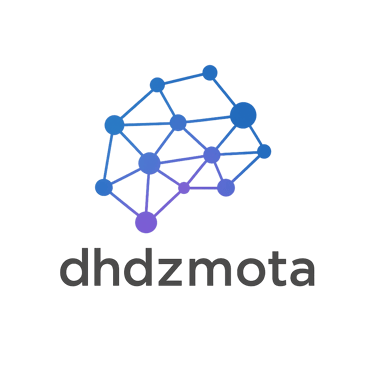
Background
A glance to my professional story.
BBVA
At BBVA, I hold the position of Data Scientist Expert within the Relationship Models team. My primary goal is to revolutionize and enhance the bank’s client interaction by leveraging data analytics. I work towards implementing strategic changes that positively impact the overall client experience, utilizing advanced analytics to drive innovation in our approach to customer engagement.


Key Contributions
Wholesale Team: Leveraged LLMs to automatically populate complex forms, reducing processing times from 6 months to just 2 weeks and dramatically improving efficiency in multi-step workflows.
SpeechdeVenta: Developed and evaluated prompt-generated sales speeches to promote products like credit cards, ensuring both performance and reliability, and often outperforming traditional approaches.
Relationship Models Team: Designed and implemented customer profiling models to holistically analyze client characteristics, strengthen long-term relationships, and transform the bank’s approach to client engagement through advanced analytics.
Additional contributions
Additionally, I have been responsible for project scoping and definition (establishing objectives and metrics for data science initiatives), data exploration (to support robust model design), and AI quality assurance (evaluating models built by other teams to ensure reliability and performance).
This role allows me to combine technical expertise with strategic business insight, pushing forward innovation at the intersection of financial services and artificial intelligence.
Me, in BBVA.
As a Data Scientist Expert at BBVA, I have contributed to the Wholesale, SpeechdeVenta, and Relationship Models teams, applying both traditional Machine Learning and Generative AI (LLMs) to optimize processes, improve customer experiences, and accelerate time-to-value. My work focuses on creating intelligent solutions that enhance product recommendations, personalize client interactions, and significantly reduce the duration of multi-step workflows.
Kueski
At Kueski, I held the position of Data Scientist (III) and accrued three years of experience specializing in fraud prevention modeling. My role involved developing and implementing advanced analytical models to safeguard against fraudulent activities.


Main focus
I joined as a junior data scientist and, within three years, was promoted to Senior Data Scientist (Data Scientist III). My main focus was fraud detection, where I developed and deployed machine learning models capable of analyzing millions of loan applications in real time. These models identified fraudulent activity with high accuracy, preventing losses and safeguarding financial resources at scale.
Additional contributions
Beyond technical contributions, I also played a key role in project leadership, managing cross-functional initiatives to improve fraud detection systems. I worked on building and refining ML models for both new and recurring users, emphasizing not only performance but also model explainability, ensuring decisions were interpretable and actionable.
In addition, I provided rapid resolution of production issues, maintaining seamless operations in a high-stakes environment. I also supported the onboarding and training of new team members, contributing to a stronger, more capable data science team.
Kueski context
After completing my studies, I began my professional career at Kueski, a leading Mexican fintech company that provides online loans to expand financial inclusion across the country.
SaturdaysAI
At Saturdays Ai, I serve as a mentor with the goal of effectively imparting knowledge on the concepts of Artificial Intelligence applied to Machine Learning. My approach involves fostering understanding through hands-on projects, emphasizing the core idea of “Code to Learn.”
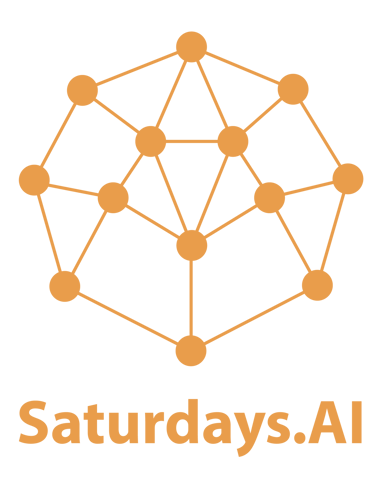

Saturday's Editions
I have participated as a mentor in multiple editions (Guadalajara II, III, IV, LATAM I, and LATAM II), both in-person and remotely. My teaching approach is built on two main pillars:
Mathematical foundations, to ensure students understand the logic and structure behind algorithms.
Clear conceptual explanations, helping participants visualize how AI models are developed and applied in practice.
Projects
Some of the projects I have mentored include CardioSight, AIreySalud, and Angiop.AI. all designed to address real-world problems with meaningful social relevance. This role has allowed me to contribute to the growth of new generations of data scientists, while also reaffirming my commitment to accessible education and socially impactful innovation.
The beginning
After completing my studies, I began sharing my knowledge by teaching artificial intelligence through SaturdaysAI, an international organization that promotes AI and machine learning education through socially impactful projects.
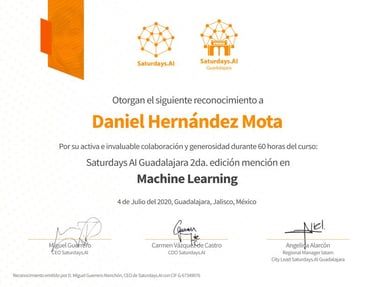
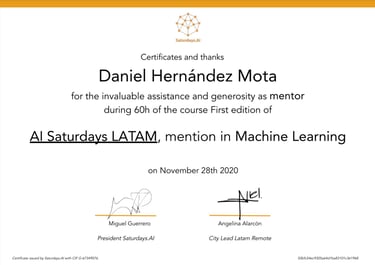


ITESO
I graduated from the Western Technology Institute of Higher Education completing Nanotechnology Engineering career.
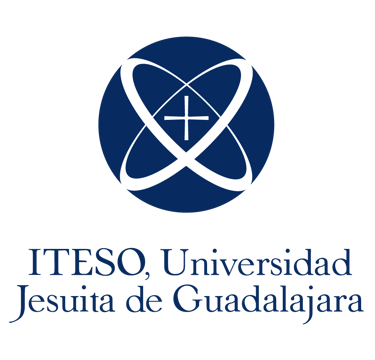

Math and Modeling
Nanotechnology and Physics
In parallel, my nanotechnology and physics studies immersed me in the principles of matter at its smallest scales and the methods to engineer materials with advanced properties. I explored subjects such as general and inorganic chemistry, thermodynamics, solid-state physics, material resistance, electromagnetism and optics, classical and quantum mechanics, electromagnetic theory, molecular modeling, and nanomaterials engineering. These experiences trained me in both theoretical and experimental approaches, from understanding the atomic structure of materials to applying computational modeling for simulation and characterization. This blend of science and engineering taught me to approach challenges with a multidisciplinary mindset; an approach I now carry into my work in artificial intelligence and data-driven innovation.
Nanotechnology Engineering
I began my professional journey at ITESO University, where I pursued a degree in Engineering in Nanotechnology. During this stage, I built the solid mathematical and physical foundations that later became essential for my development as a data scientist. My academic training equipped me with a wide range of skills.
I developed a strong mathematical foundation that sharpened my ability to analyze and model complex systems. My coursework covered a wide range of topics including differential, integral, and multivariable calculus, linear algebra, differential equations (ordinary and partial), numerical methods, complex variables, stochastic calculus, and tensor calculus. These subjects not only gave me the tools to approach problems with rigor and precision but also trained me to think abstractly, connect patterns, and translate real-world challenges into solvable mathematical models. This background has been essential in my transition to data science, where mathematical reasoning underpins everything from statistical analysis to advanced machine learning.
CUCEI
My Professional Application Project (PAP) was about helping external investigation centers. In this case, I helped on the development of quantum computer simulations.
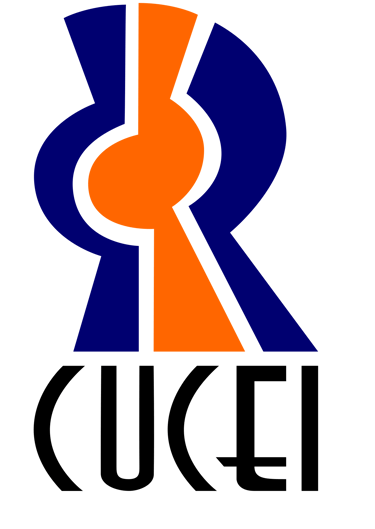

Research in quantum computing
The research was focused on theoretical quantum computing, specifically the project “Quantum Algorithms Implemented on a C12-C13 Diamond Computer [Part 1 and Part 2]”. The aim was to simulate a quantum computer by solving the differential equations of the physical system using the Runge-Kutta numerical method (4th order).
Through this simulation, we sought to replicate fundamental quantum algorithms such as quantum entanglement and quantum teleportation, in order to evaluate both their feasibility and the challenges associated with implementing them in a diamond-based quantum system.
Understanding and applying
This project allowed me to deepen my understanding of quantum mechanics, numerical methods, and algorithmic design, while also strengthening my skills in modeling complex systems computationally. It was a milestone that connected my physics background with my growing interest in data science and advanced computation.
PAP
To conclude my undergraduate studies, I carried out my Professional Application Project at CUCEI (Centro Universitario de Ciencias Exactas e Ingenierías) of the University of Guadalajara, collaborating with Mtra. Karina Chiñas Fuentes and under the supervision of Dr. Gustavo López Velázquez.
IronHack
A big step on my professional path was taking a course in applied data analytics, where I amplified my abilities to develop code in a code-to-learn environment.
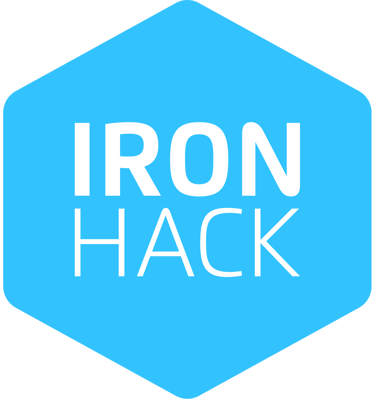

Python
I solidified my foundation in Python by applying it to diverse data scenarios. Beyond simply using the language, I focused on building efficient solutions and refining my programming style, which has become central to my work as a data scientist.
Analytical mindset
This experience helped me enhance my analytical thinking, particularly in how I approach data interpretation, and problem-solving. This perspective continues to influence how I design models, extract insights, and make data-driven decisions.
Hands-on learning
During this bootcamp, I embraced a code-to-learn methodology, where every concept was directly reinforced by writing and testing code. This practical approach allowed me to solve real-world problems while strengthening my ability to think critically in dynamic learning environments. I did not finish but then I returned to talk about model explainability.
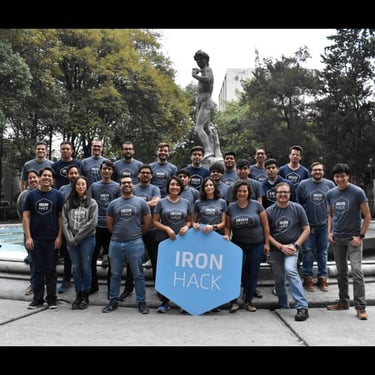
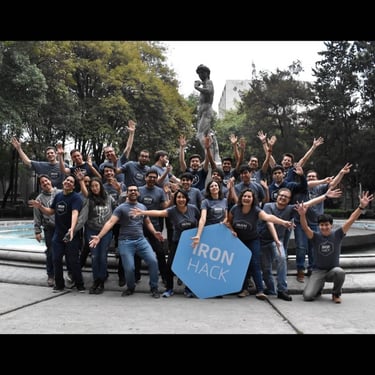
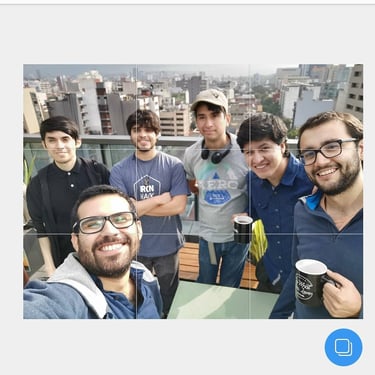
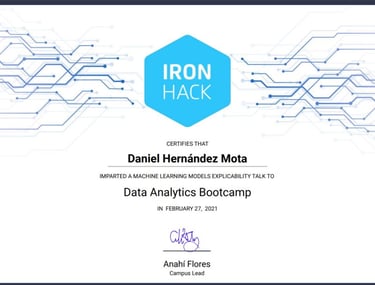




Masaryk
At university, I had the opportunity to go on an international summer exchange program to the Czech Republic. Here I helped with the investigation of plant physiology.
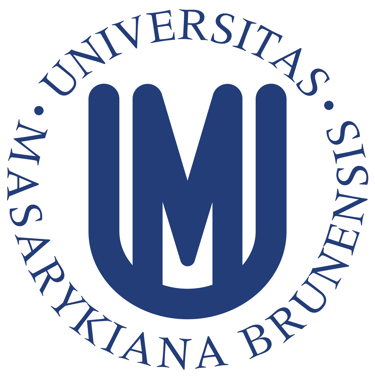

Scientific Research
The experience not only strengthened my scientific research skills—such as hypothesis design, data collection, and academic writing—but also exposed me to the collaborative nature of international research. The project culminated in the publication of a scientific article titled “Early Changes in Nitrate Uptake and Assimilation Under Drought in Relation to Transpiration”, under the supervision of Dr. Vít Gloser.
Data-driven Research
This internship marked a key milestone in my academic journey, teaching me the value of connecting theoretical models with experimental evidence, and laying the foundation for my later work in data-driven research.
Masaryk Investigation program
The project was a Research Lab Internship focused on plant physiology, specifically investigating how plants respond to nitrogen uptake and assimilation under drought conditions. This work combined laboratory experimentation with data analysis, allowing me to better understand the relationship between nutrient absorption, water stress, and plant transpiration.
